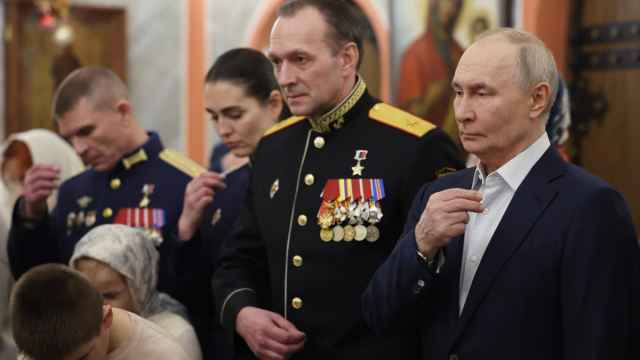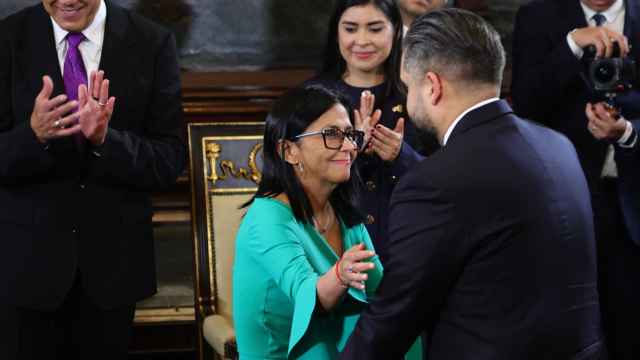A group of North Caucasus insurgents, including at least one young Chechen driven by hatred over Prime Minister Vladimir Putin's decision to launch the second Chechen war in 1999, attempted to bomb a Sapsan bullet train last month, but their plot was foiled by the Federal Security Service, a news report said Monday.
The report in Kommersant provided the first details of a plot first mentioned by Federal Security Service director Alexander Bortnikov during a televised meeting with President Dmitry Medvedev last month.
Bortnikov gave no details at the time and did not mention the German-made Sapsan, popular with the country's rich and powerful.
The FSB did not comment on Kommersant's report Monday, but RIA-Novosti provided some confirmation and an additional detail, saying the FSB had learned about the plot from an informant within the insurgency. RIA-Novosti cited an unidentified law enforcement official as its source.
Kommersant, citing the FSB, said the agency has arrested a group of four men from Kabardino-Balkaria, Chechnya, Ingushetia and Mordovia — a Volga region with an Islamic Tatar minority — on suspicion of organizing the plot on a Sapsan traveling between Moscow and St. Petersburg.
The Sapsan carries up to 600 passengers and runs at up to 250 kilometers per hour, which means the death toll from an attack could have stood in the hundreds.
The FSB believes the attack was masterminded by Kabardino-Balkaria native Islam Khamuzhev, 22, who allegedly trained with Islamist militants in Dagestan and was assigned the bombing mission by them last year, the report said.
Khamuzhev then traveled to Moscow, where he recruited three others for the job, including natives of Chechnya and Ingushetia who played football in local amateur teams. All four met through one of the city's mosques, the report said.
One suspect, Chechen Murad Edilbiyev, 22, told investigators after his arrest that he decided to participate in the attack as revenge for the 1999 war in Chechnya, where "his countrymen were killed" and "the rights of residents were grossly violated," the report said. He was 10 at the time that then-Prime Minister Putin initiated the war in response to a Chechen rebel incursion in Dagestan and a series of deadly apartment bombings in Moscow and other cities.
The attackers constructed a time bomb using ammonium nitrate, an agricultural fertilizer, and chose the site for the blast: a train station some 20 kilometers north of Moscow.
But the suspects were detained before they could plant the explosives, the report said, adding that the FSB had been tracking the group's preparations for a long time.
The four suspects face up to 20 years in prison on charges of terrorism and illegal firearms possession. At least one of them will seek a plea bargain, his lawyer told Kommersant.
This is not the first time that a train has been targeted en route between Moscow and St. Petersburg. The Nevsky Express was derailed by bomb attacks in 2007, which injured about 60, and in 2009, which killed 28.
The FSB has blamed the first blast on Islamist insurgent Pavel Kosolapov, who remains at large. Chechen warlord Doku Umarov, also on the run, has taken credit for the second blast.
A Message from The Moscow Times:
Dear readers,
We are facing unprecedented challenges. Russia's Prosecutor General's Office has designated The Moscow Times as an "undesirable" organization, criminalizing our work and putting our staff at risk of prosecution. This follows our earlier unjust labeling as a "foreign agent."
These actions are direct attempts to silence independent journalism in Russia. The authorities claim our work "discredits the decisions of the Russian leadership." We see things differently: we strive to provide accurate, unbiased reporting on Russia.
We, the journalists of The Moscow Times, refuse to be silenced. But to continue our work, we need your help.
Your support, no matter how small, makes a world of difference. If you can, please support us monthly starting from just $2. It's quick to set up, and every contribution makes a significant impact.
By supporting The Moscow Times, you're defending open, independent journalism in the face of repression. Thank you for standing with us.
Remind me later.





